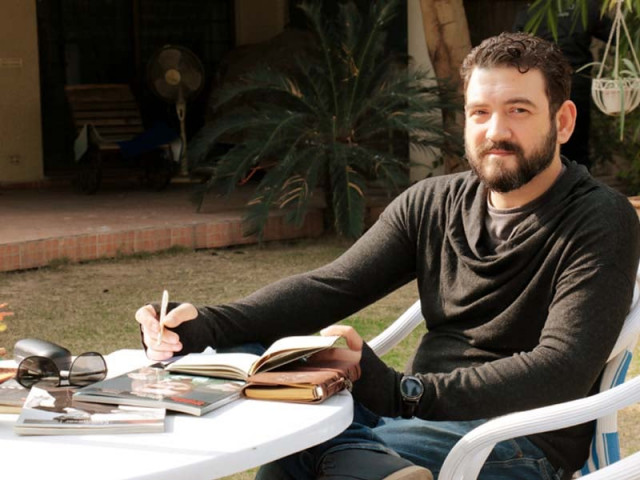The director’s cut: Saya-e-Khuda-e-Zuljilal
Umair Fazli talks to us about his passion for filmmaking

Was there a particular event or time when you recognised that filmmaking was more than just a hobby?
I remember I was studying Law in London and one day I turned to my father and told him that Law wasn’t working out for me, and therefore wanted to switch to filmmaking like my grandfather, who was also a well-known filmmaker. My grandfather, Syed Sibtain Fazli, not only introduced Mohammad Ali and Zeba Bakhtiar to Pakistani cinema, but also got Madam Noor Jehan into acting back in the day. So that path was already there, it was just waiting for someone to walk on it, and from my family I ended up going down that road!
You have done a lot of theatre acting. Did that experience help you understand and guide your actors better?
My experience in theatre helped overall, not just with the actors but also with managing production. I have been involved in production since I was 15 years old, and produced my first play when I was a teenager. Subsequently, I did multiple productions for five to six years.
Out of all the music videos you have worked on, which one has been your favourite and why?
There are two that stand out; one is a major passion project that I did for Sanam Marvi and the band Siege, it’s called ‘Vairay Avar’. I just heard the track and fell in love with it. It was my first real exposure to Bulleh Shah and we had zero contact with the singers or producers. I ended up sitting with my director of production and we came up with the whole story line from scratch. The second memorable one was the Pakistan Super League video that I worked on with my brother-in-law, Ali Zafar. I got to work with a lot of superstars such as Wasim Akram, Shane Watson and Misbahul-Haq. It was great work experience as pre-production was one day, shooting and editing one day and by the fourth day it was aired.
How was your experience working with Pakistan’s legendary director Shoaib Mansoor on Supreme Ishq II?
It was a fantastic experience and a real eye opener as it was the first time I was exposed to working on a large-scale project. It was possibly the biggest production that Pakistan had seen till that point — it was just phenomenal. Not only was I assisting Shoaib Mansoor, but I also ended up playing an extra in the video!
You graduated from Toronto Film School. According to you, how important is it for a director to get formal education in filmmaking? How did it help you in the real world?
As with any other field in the world, you need to get your basics right first. It’s not like the day you step out of film school you’ll be able to direct a film. I directed my first film 10-years after film school. I did a lot of television projects and media campaigns in between. People keep saying that they want to be out-of-the-box, but film school teaches you what the box actually is. After that, you are free to experiment.
Saya-e-Khuda-e-Zuljilal is your debut film as a director; did the audience’s response match your expectations?
The audience’s response was fantastic and the reviews we got from the critics were way beyond our expectations. The footfall in cinemas has been low ever since the Bollywood ban came, but that hasn’t dissuaded us as the film did well.
Which films have inspired or influenced your work?
That would be an endless list, but Fight Club would top my list. Not only was it a completely new dimension to storytelling, but also it’s a personal favourite.
When do you know a script is ready to shoot, and what is your process of getting it there?
The script usually keeps evolving and changing along the way, but majority of the script still remains. You keep working on it but there comes a point when you have to draw the line. At the end of the day it is a business, and there is a certain amount of budget and time allocated to screenwriting.
Recently there have been a lot of positive changes in the Pakistani film industry, but what is the one thing you think still needs improvement?
It would definitely have to be support from the government. We just found out that we have been taxed an additional 65 per cent. The government needs to lend their support to this growing industry or such taxes could kill the cinema industry at this point.
What can we expect from your next film?
Gunjal is something completely different from my first film. Not only is it a horror, thriller and murder mystery, but it is also a true story of a serial killer. I’m in talks with Farhad Humayun for playing one of the characters which will be quite interesting.


















COMMENTS
Comments are moderated and generally will be posted if they are on-topic and not abusive.
For more information, please see our Comments FAQ